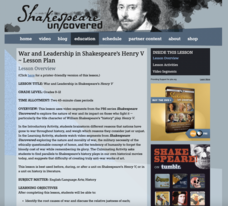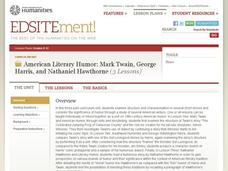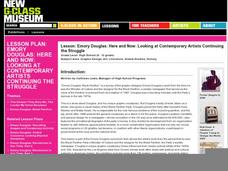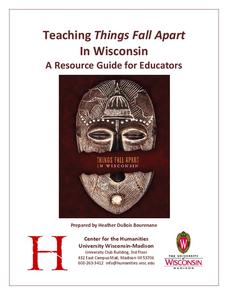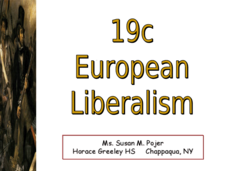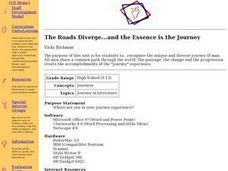Curated OER
Rudyard Kipling's "Rikki-Tikki-Tavi": Mixing Fact and Fiction
"Rikki-Tikki-Tavi," from The Jungle Book, offers young readers a chance to examine how Rudyard Kipling uses setting and personification to bring to life the brave mongoose who battles cobras to protect his family. Class members explore...
Curated OER
Children's Book Creations
Students create a children's book version of the Japanese folk story "Momotaro Boy of the Peach" and present the story to elementary students. In this children's book lesson, students design their book to explain Japanese culture to...
Curated OER
Wild Children 1
In this Romulus and Rebus interactive exercise, students read a short passage about Rome and how it was built. Students answer questions, fill in the blanks and complete a writing activity in an interactive format based on the reading.
Curated OER
King Arthur: Man or Legend
Students research the Legend of King Arthur. In this King Arthur lesson, students explore him as he is presented in stories, poems, and art. Students compare and contrast the real life of King Arthur versus the man in legends and...
Curated OER
Holocaust Theme
Learners complete a unit of lessons on the events of the Holocaust during WWII. They write daily journal entries, create a collage, view and discuss videos, read and analyze novels and poetry, and complete a novel project.
National Endowment for the Humanities
Nathaniel Hawthorne and Literary Humor
Young scholars examine Nathaniel Hawthorne's style of humor and compare it to other humorists. They discuss the purpose of literary humor and determine how it develops characters and plots in stories. They analyze the use of different...
Curated OER
Picture a Character
How would Jean-Etiénne Liotard paint the characters from "The Little Mermaid?" What would the main character from "The Little Match Girl" look like from Francisco José de Goya y Lucientes' point of view? After examining various paintings...
National Endowment for the Humanities
"Old Southwest" Humorists and George Washington Harris
Young scholars discover the work of George Washington Harris and his influence on American humor. For this George Washington Harris lesson plan, discuss cultural differences in the United States and read Sut Lovongwood stories by George...
Shakespeare Uncovered
War and Leadership in Shakespeare’s Henry V
“Compared to war all other forms of human endeavor shrink to insignificance.” “War is not healthy for children and other living things.” These two views of war, embodied in George Patton’s statement and Lorraine Schneider‘s famous 1966...
National Endowment for the Humanities
American Literary Humor: Mark Twain, George Harris, and Nathaniel Hawthorne
Nathaniel Hawthorne as a humorist? Really? The three lessons in this series focus on the the storytelling style, conventions, and literary techniques employed by Hawthorne, George Washington Harris, and Mark Twain.
Livaudais-Baker English Classroom
Kindred
This first in a series of four resources is designed for instructors to use Octavia E. Butler's Kindred in their classes. The packet includes an overview of the unit, a day-to-day calendar, links to background articles, and reading...
Curated OER
Lesson: Emory Douglas: Here and Now: Looking at Contemporary Struggle
After looking into the life, art, and social contributions of artist Emory Douglas, learners analyze several social art pieces. They use Emory Douglas as an example of social art, then consider 10 other pieces. They write a paper...
Shakespeare Uncovered
All the Globe’s a Stage: Shakespeare’s Theatre
“All the world’s a stage,” exclaims Jaques in As You Like It, but it is the structure of the Globe stage and how that structure influenced Shakespeare’s plays that is the focus of an on-line research project. Class members visit a series...
Curated OER
May I Take Your Order, Please?
Pupils read a story, boil down that story to 5 to 7 key events, create a sequencing quiz to go with the story and have their classmates take the quiz. They will the strategy of sequencing by reading various stories (that they are not...
The Kennedy Center
Fairy Tale Variations
Here are two great lessons that work together and are inspired by the Stephen Sondheim musical Into the Woods. Young writers and actors will retell the story of "The Frog Prince" through games, improvisational script writing, and song....
University of Wisconsin
Teaching Things Fall Apart in Wisconsin: A Resource Guide for Educators
“There is no story that is not true, . . .” And uncovering the truths in Things Fall Apart is the focus of a 68-page resource packet designed to provide instructors with a wealth of materials that enhance understanding of Chinua Achebe’s...
Curated OER
A Study Guide for The Phantom of the Opera
Immerse yourself in the beautiful, twisted world of Andrew Lloyd Webber's The Phantom of the Opera. A detailed lesson plan provides important details about the writing, stagecraft, music, and literary elements of the famous musical, as...
Curated OER
How to Create a Virtual Mediterranean Cruise
Young scholars determine the ports they visit and develop a plan to study each region’s history and culture.
Curated OER
19c European Liberalism
If you'd like to prompt some great discussions in your history class, this presentation will surely get your class talking. Addressing 19th century liberalism in Europe (including influences from England, France, America, and Ireland),...
Curated OER
The "Write" Stuff: Strategies and Conventions for Imaginative Writing
Fifth graders develop and practice the steps involved in imaginative writing. They follow the steps/worksheets included and write imaginative stories of their own.
New Class Museum
Lesson: Elizabeth Peyton: Portraits: Androgyny in Contemporary Culture
Portraiture, artistic expression, romanticism, and androgyny are discussed in a thought-provoking lesson. Upper graders first discuss and examine the history of portraiture and the elements common to the Romantic style. Then they turn...
Curated OER
African-American History and Culture in the English Classroom
Ninth graders identify and recognize characteristics of nonfiction in literary works, explore language and culture of Gullah people, compare and contrast purposes of spirituals and quilts in terms of their relationships to escape from...
Curated OER
The Roads Diverge...and the Essence is the Journey
Students examine the diverse and unique journeys of men. After reading various pieces of literature, they identify any rites of passage or change in the characters. They write in their reflective journals sharing their thoughts on the...
Curated OER
Grandma Tells A Story
Students read a story with the teacher to reflect upon their own family history. The application of the story is when children create their own family tree and complete the questionaire.










